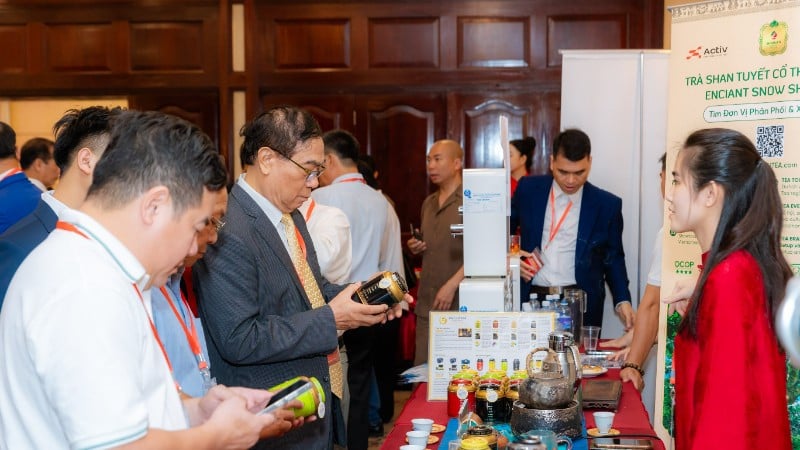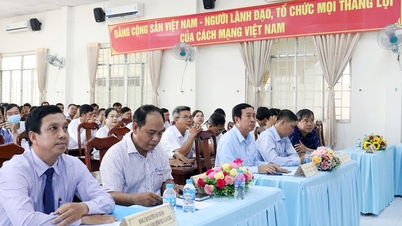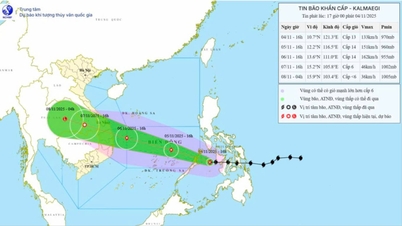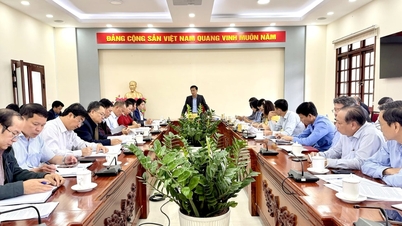
Commercial fraud hinders the development of the digital economy
Currently, the situation of commercial fraud in Vietnam is becoming more and more complicated. Fraud not only appears in traditional markets but also spreads on e-commerce platforms, where thousands of stores take advantage of social networks and influential people to promote poor quality products.
According to the National Steering Committee 389, up to now, there have been about 34,000 cases of counterfeit goods and trade fraud detected since 2025. The consequences of this activity are serious, causing loss of consumer confidence, causing great damage to legitimate businesses and causing the State to lose tax revenue. This leads to a distorted domestic market, unfair competition, and hinders the development of the digital economy. In that context, building an effective coordination mechanism between the State - Enterprises - Associations has become an urgent requirement to orient, manage and develop e-commerce activities in a transparent, responsible and sustainable manner.
Many studies have shown that an effective management model for digital communication activities needs to be based on the principle of combining three parties: State - Enterprises - Associations. This linkage model aims to build a transparent market, healthy competition and sustainable development. In which, the State plays the role of a guiding and regulating subject, promulgating policies, laws, standards and inspection and supervision mechanisms, ensuring the publicity and transparency of the market. The State also plays a coordinating role and promotes inter-sectoral cooperation, connecting with enterprises and associations in information sharing, market monitoring, as well as deploying advanced technology solutions such as: AI, blockchain, QR code, RFID to trace the origin, detect counterfeit and poor quality goods.
Enterprises are the central subjects of the market, responsible for complying with the law, providing transparent information, proactively preventing fraud and protecting consumer rights. At the same time, enterprises are also the direct enforcement force, contributing to spreading professional ethics and business culture.
The Association plays the role of a bridge and intermediary coordinator, connecting the State and businesses. This is a place to gather the common voice of the business community, convey policy feedback, and at the same time deploy training, communication, technical support and build a code of professional conduct for individuals and organizations participating in the digital ecosystem.
The harmonious coordination between the three subjects not only helps improve management efficiency but also creates a flexible self-regulating mechanism, contributing to the formation of a transparent, responsible and trustworthy business environment in the process of national digital transformation. Taking examples from practical experience in a number of countries, Master Kieu Cong Thuoc, Chairman of the Board of Directors of the Vietnam Innovative Startup Fund Investment and Development Joint Stock Company (VNFund) said: In China, the management of influential individuals on social networks is carried out through strict regulations on content and professional ethics, combined with strong sanctions, even criminal prosecution for serious violations. In Korea, a socialized monitoring mechanism is also implemented, in which professional associations and user communities participate in criticizing, evaluating and boycotting substandard behaviors.
In Vietnam, although the management of e-commerce activities has achieved many positive results, the formation and operation of the "State - Enterprise - Association" linkage model is still facing many multi-dimensional challenges. According to Master Kieu Cong Thuoc, there are three prominent issues that need to be clearly recognized: increasingly sophisticated commercial fraud tricks, combining digital technology and consumer psychology, making it difficult for management agencies to detect and handle in a timely manner. Human resources and technical infrastructure of many functional agencies are still limited, while the development speed of digital platforms far exceeds the ability of traditional supervision. The legal system and coordination mechanism between the state, enterprises and associations are still lacking in synchronization; many processes are overlapping, there is no mechanism for sharing data, information and clearly defining responsibilities between parties.
Building a healthy and sustainable digital media ecosystem
Closely linking the State - Enterprises - Associations is the fundamental solution to help strengthen social trust, protect the market and promote healthy e-commerce development. To sustainably develop e-commerce activities, Mr. Pham Minh Hieu, TrueData traceability technology expert, believes that it is necessary to combine the legal corridor, technology and responsible social media.
The “three-house” association model is based on the principles of co-governance, co-responsibility and co-benefits, aiming at the goal of building a transparent market, healthy competition and sustainable development. When “transparent technology - transparent market - transparent trust” will create a foundation for e-commerce to develop.
According to Master Kieu Cong Thuoc, it is necessary to build a transparent communication culture, an “Influencer Trust” program and a professional certification mechanism. Enterprises need to proactively control promotional content and transparent contracts, while associations play the role of a bridge, training and technical support.
Faced with the challenges, experts believe that it is necessary to synchronously deploy four key groups of solutions. First, the state needs to complete the legal framework, issue standards on professional ethics, advertising and e-commerce; at the same time, establish a channel for reflecting and handling online violations to improve management efficiency and policy response speed.
Businesses must proactively build a content control system, have transparent contracts with influential individuals, apply digital technology to monitor disguised advertising and protect brand reputation.
Associations need to promote their role as a bridge, organize training, provide legal advice, provide technical support and build a code of professional conduct for the content creation community on the internet.
Finally, it is necessary to promote community communication and international cooperation, learn from the experiences of advanced countries, thereby strengthening social trust and creating a foundation for the e-commerce market to develop transparently and sustainably.
The State-Enterprise-Association linkage model in managing the activities of influential individuals on the Internet is a suitable direction to ensure a balance between development and control, between creative freedom and social responsibility. Technology experts said that to achieve effectiveness, it is necessary to improve the law on advertising and e-commerce; establish an inter-sectoral coordination mechanism between ministries, branches and professional associations; increase the application of digital technology (AI, blockchain) in monitoring content and detecting fraud; improve the capacity and professional ethics of the team of influential people on the Internet through training and professional certification.
It can be seen that the synchronous coordination between the "three houses" not only helps control risks but also contributes to building a healthy and sustainable digital media ecosystem, strengthening social trust and promoting the stable development of Vietnam's digital economy in the long term.
Source: https://nhandan.vn/lien-ket-ba-nha-bao-ve-thi-truong-truc-tuyen-minh-bach-post919994.html


![[Photo] Ca Mau "struggling" to cope with the highest tide of the year, forecast to exceed alert level 3](https://vphoto.vietnam.vn/thumb/1200x675/vietnam/resource/IMAGE/2025/11/04/1762235371445_ndo_br_trieu-cuong-2-6486-jpg.webp)
![[Photo] Ho Chi Minh City Youth Take Action for a Cleaner Environment](https://vphoto.vietnam.vn/thumb/1200x675/vietnam/resource/IMAGE/2025/11/04/1762233574890_550816358-1108586934787014-6430522970717297480-n-1-jpg.webp)

![[Photo] Panorama of the Patriotic Emulation Congress of Nhan Dan Newspaper for the period 2025-2030](https://vphoto.vietnam.vn/thumb/1200x675/vietnam/resource/IMAGE/2025/11/04/1762252775462_ndo_br_dhthiduayeuncbaond-6125-jpg.webp)
![[Photo] Comrade Nguyen Duy Ngoc holds the position of Secretary of the Hanoi Party Committee](https://vphoto.vietnam.vn/thumb/1200x675/vietnam/resource/IMAGE/2025/11/04/1762234472658_a1-bnd-5518-8538-jpg.webp)
![[Photo] The road connecting Dong Nai with Ho Chi Minh City is still unfinished after 5 years of construction.](https://vphoto.vietnam.vn/thumb/1200x675/vietnam/resource/IMAGE/2025/11/04/1762241675985_ndo_br_dji-20251104104418-0635-d-resize-1295-jpg.webp)






























































































Comment (0)